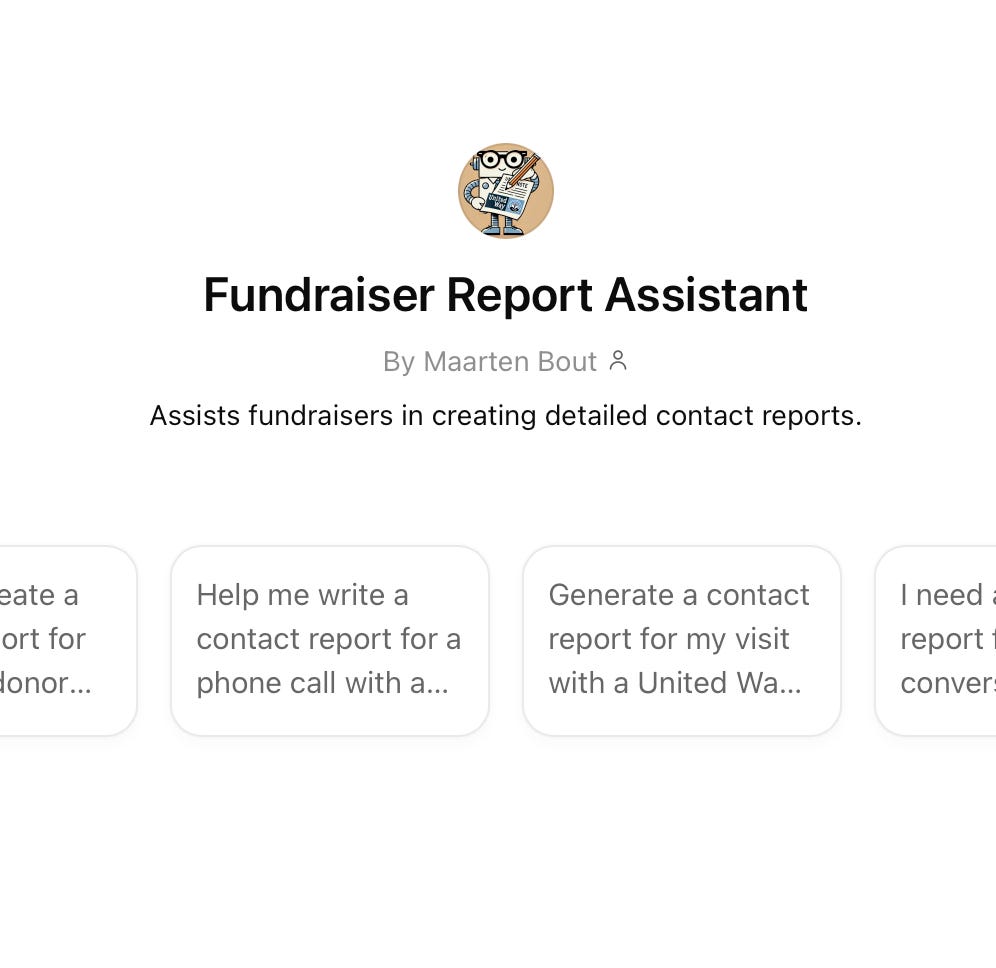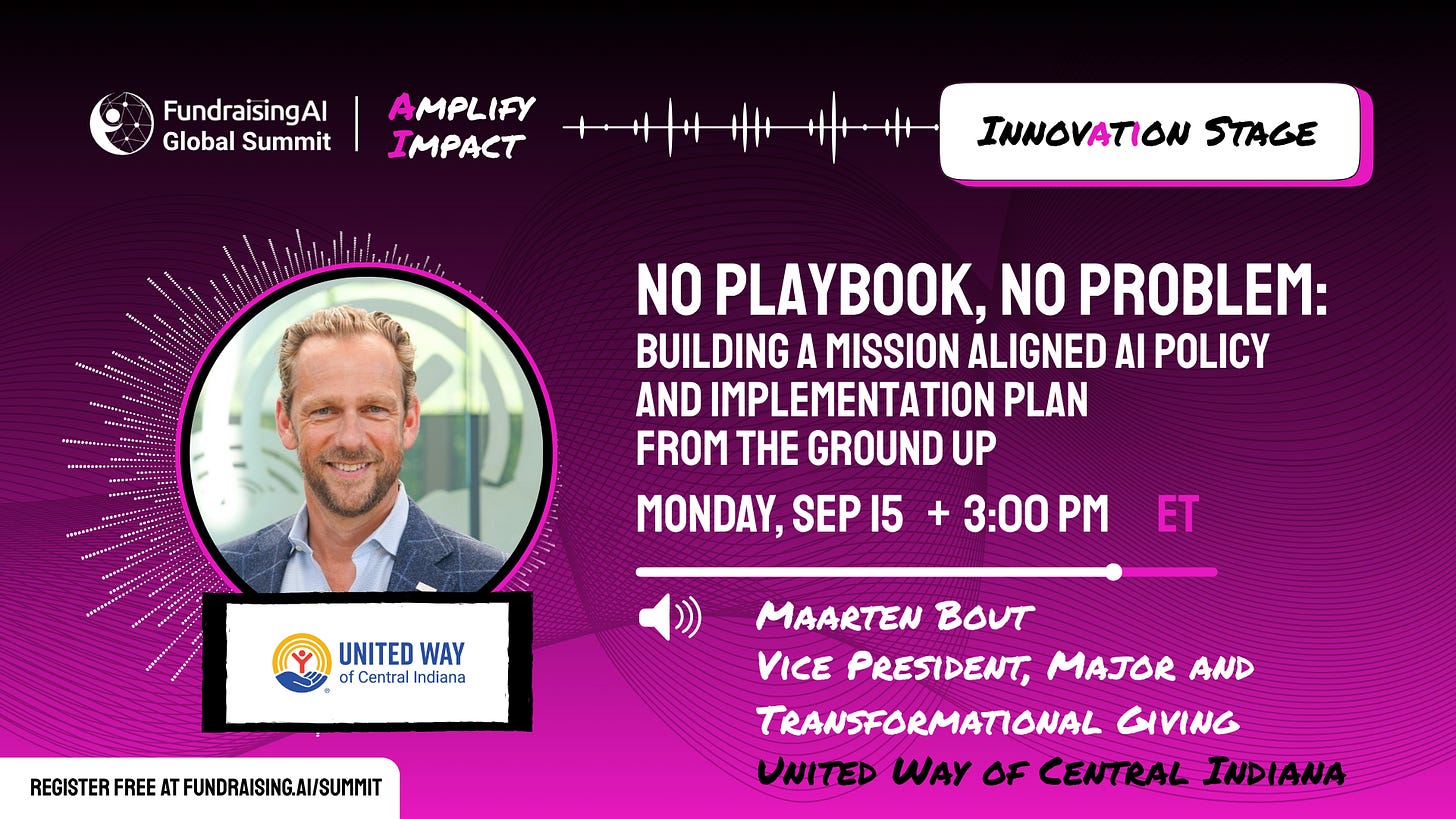Contact Report Bot Will Take Part of Your Job
And I think it will make it better...
Yesterday someone asked me how to best use AI in the context of fundraising, and I told them a variety of options. The one that stands out to me as the number one way, however, is using AI to open up time for the things you love in your job, or, where the needle moves most.
For most fundraisers, I assume, that is spending time with donors.
I phrased my answer to my colleague in a way that was inspired by a Planet Money podcast about how AI will shape the future of work from earlier this week. In it, reporters Sally Helm and Amanda Aronczyk, talk to economist Daniel Rock about how AI affects all kinds of jobs. This section of the podcast, taken from the transcript available on the NPR website, stood out to me:
HELM: Daniel thinks that organizations will need to experiment. He gave me an example of a study where a company gave an AI tool to two groups of paralegals. One group was told, just use these tools to get more productive. And the other group was told, use these tools to do the parts of your job that you hate.
ROCK: The office where they said, use this tool to get rid of the things you don't like doing, the paralegal role changed. They really flourished. They started working on some work that even seemed like junior attorney work. In the other office, there was limited adoption. It didn't really make as much of a dent.
I highly recommend listening to the full episode .
What the paralegal study illustrates I how I have come to think about one way of deploying AI in our work. About 6 months ago, I started thinking about this in the context of my team at UWCI: find those things that we don’t necessarily like doing, just takes too much 10-80-10 time, or we aren’t too consistent in, and have AI assist us to be better versions of ourselves.
Contact reports are a great example here: they’re a critical piece of institutional and personal memory. They often contain a wealth of information on how the donor feels about the cause, the organization, their motives, values, and key pieces of life information that may not be found in the public information realm.
What’s also true is that most contact reports are pretty poorly written, and as a result, even though they might be written, they may not be that useful.
In our empathy in contact reports study from 2018 I found that there was tremendous variation in how contact reports were filled out. Fundraisers often aren’t trained on writing good contact reports, even though our study found that there are characteristics of contact reports that are connected to giving outcomes, like mentioning follow up steps and mentioning donor motives and values (high on cognitive empathy). In some instances, there may be incentives to NOT write contact reports at all. Fundraisers may compete with other fundraisers at the same institution for philanthropic support from the same donors (which sounds absolutely nuts, but such is the world some of my colleagues inhabit).
To address both problems of quality of contact reports and that fundraisers could really use an easier way to do contact reports, a while back I experimented with creating a GPT that would allow for easy generation of high-quality contact reports. From that same study, we were able to reverse engineer a template contact report that included all particular aspects of what we found the good contact reports all had in them. So, I trained a GPT on those things we found associated with meaningful contact reports that were associated with desirable giving outcomes.
The public version of this can be found here.*
Our internal version is called Contact Report Bot.
Contact Report Bot helpfully asks you a series of questions that elicit those pieces of information that are found in meaningful contact reports. Then it drafts a report for you that you can either copy/paste into your CRM.
And, because you can use it in voice mode, you can do it from the parking lot of the breakfast place you just met that lovely couple in their seventies who really care about {values/cause/interest/passion} in {location} because {their origin story} – and, their cousin who had the hard time, his name was Timmy.
The resulting reports so far… pretty good. Just make sure it isn’t making stuff up.
I anticipate that using a tool like this will dramatically reduce friction in this small, but frequent task for fundraisers: no writers block, little time commitment, and little forgotten information that was critical, and couldn’t be remembered two weeks later.
It also will dramatically increases uniformity and useful information that can help understand the donor decades later (or help philanthropy nerds do research on it later on, just saying).
I suspect it will really boost both the number and quality of contact reports when a practice like this really becomes a widely used. AND it will likely also creates a reality in which more time can be spent with donors.
So, like the Planet Money paralegal example and the contact report bot above show, when thinking about AI, one practical application is to find small things, that add up to a big burden and then find a simple way to make that a much smaller lift.
This way we get to do more of the fund part of our job, connecting with other humans.
Speaking of AI in fundraising
Next week, two of my colleagues, Kim Reeves and David Schroeder, and I will present on UWCI’s road to AI adoption at Fundraising.AI global summit. It’s free and I think you would benefit from being there even if you are a skeptic. We will talk about how we drew a roadmap for adopting AI in an ethical and beneficial way, the policy we created, the mistakes we made, and lessons we learned. Moreover, our presentation actually praises the skeptics for making us better. Hope to see you there.
*A quick warning. If you’re using the free, public version of ChatGPT, putting PII in there is not advised (so, don’t say any names, etc.) Any information you give it may be used to train its models.


